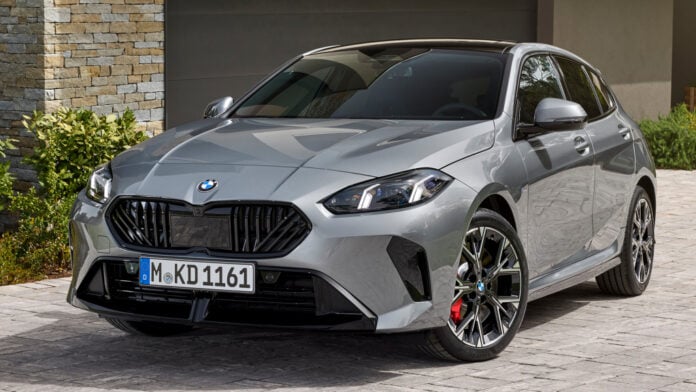In the competitive landscape of the automotive market, consumers are constantly seeking the best deals on new vehicles. Recent trends indicate a significant shift in pricing strategies, especially for popular models. The BMW 1 Series, known for its luxury and performance, is currently available at substantial discounts through a leading car brokerage platform. This development raises questions about the factors influencing such price reductions and the implications for both consumers and the automotive industry as a whole.
The current pricing dynamics suggest that buyers may have an unprecedented opportunity to acquire high-end vehicles at reduced rates. As dealerships and manufacturers navigate the post-pandemic market recovery, the introduction of incentives and discounts has become a common strategy to stimulate sales. This scenario not only benefits consumers but also poses challenges for manufacturers aiming to maintain brand prestige while remaining competitive. How will these discounts reshape consumer perceptions and purchasing behaviors in the luxury car segment?
Understanding the Discounts on the Bmw 1 Series
The BMW 1 Series has long been celebrated for its blend of luxury, performance, and practicality. However, the current discounts available through car brokerage platforms like Carwow have caught the attention of potential buyers. These discounts can significantly lower the entry price for a vehicle that typically commands a premium in the market. By leveraging online platforms, consumers can access a range of offers that may not be available through traditional dealership channels, enhancing their bargaining power.
For instance, the discounts on the BMW 1 Series can reach thousands of dollars, depending on the model and configuration. This pricing strategy not only attracts budget-conscious buyers but also appeals to those who may have previously considered other brands. The ability to compare offers from multiple dealerships in one place allows consumers to make informed decisions, thereby increasing competition among sellers and driving down prices further.
Moreover, these discounts reflect broader trends in the automotive industry, where manufacturers are re-evaluating their pricing structures in response to changing consumer demands. As buyers become more price-sensitive, the willingness of brands to offer significant discounts may indicate a shift in how luxury vehicles are marketed. This evolution could lead to a more democratized luxury car market, where high-end models become accessible to a wider audience.
The Role of Online Platforms in Car Buying
Online car brokerage platforms have revolutionized the car-buying experience by providing consumers with tools to compare prices, read reviews, and access special offers. Carwow, in particular, has emerged as a popular choice for buyers seeking competitive pricing on new vehicles, including the BMW 1 Series. These platforms simplify the often complex car-buying process, allowing users to navigate through numerous options with ease.
The convenience of online shopping has never been more relevant, especially as consumers increasingly prefer digital solutions over traditional in-person dealership visits. With the ability to negotiate prices and explore financing options online, buyers can secure deals without the pressure often associated with face-to-face negotiations. This shift has empowered consumers, enabling them to make choices based on comprehensive information rather than relying solely on the sales tactics of individual dealerships.
Furthermore, the transparency offered by online platforms fosters trust between buyers and sellers. By displaying a variety of offers side by side, consumers can discern fair market value and avoid overpaying for their new vehicle. As the automotive market continues to evolve, the role of online platforms is likely to expand, influencing how consumers approach car purchases and shaping the strategies of traditional dealerships.
Implications for the Luxury Car Market
The significant discounts on the BMW 1 Series raise important questions about the future of the luxury car market. While lower prices may attract a broader customer base, they also challenge the perception of luxury brands. Traditionally, luxury vehicles have been associated with exclusivity and high price tags. However, as discounts become more commonplace, brands must find a balance between accessibility and maintaining their premium image.
Additionally, the competitive landscape may force manufacturers to rethink their marketing strategies. As more consumers seek value for their money, luxury brands may need to emphasize features that justify their higher price points. This could include enhanced technology, superior craftsmanship, or exclusive services that elevate the ownership experience beyond mere transportation.
Ultimately, the current trend of discounts on luxury vehicles like the BMW 1 Series may signal a turning point in consumer behavior. As buyers become accustomed to lower prices, their expectations for future purchases will likely shift. Brands that adapt to these changes by offering value without compromising quality will be well-positioned to thrive in an increasingly competitive market.
Future Trends in Automotive Pricing
The automotive industry is at a crossroads, with evolving consumer preferences and economic conditions influencing pricing strategies. As seen with the BMW 1 Series, discounts are becoming a strategic tool for manufacturers to attract buyers in a crowded marketplace. This trend raises the question of whether such pricing models will become the new norm in the luxury segment.
Looking ahead, it is plausible that more brands will adopt similar discount strategies to remain competitive. As the market stabilizes post-pandemic, manufacturers may need to reassess their pricing frameworks to meet the demands of a more price-sensitive consumer base. This could lead to a more dynamic pricing environment where discounts and incentives are regularly offered, even for luxury vehicles.
Moreover, the integration of technology in the car-buying process will likely continue to shape pricing strategies. As online platforms gain traction, manufacturers may leverage data analytics to better understand consumer behavior and tailor their offers accordingly. This data-driven approach could result in more personalized pricing, enhancing the overall buying experience and fostering customer loyalty.
The ongoing evolution of the automotive market suggests that consumers can expect a more competitive landscape in the future. As manufacturers adapt to changing demands, the availability of discounts on luxury vehicles like the BMW 1 Series may pave the way for a new era of car buying, where value and quality coexist harmoniously.


